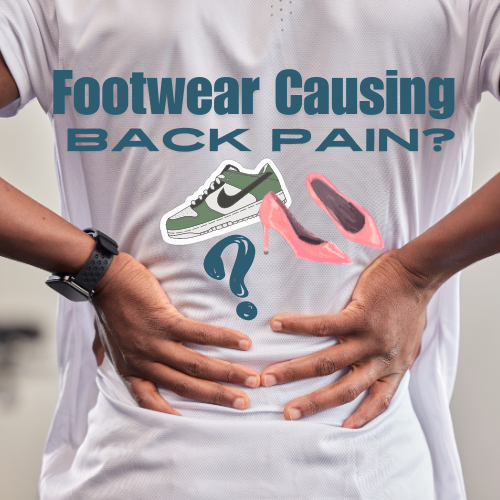Introduction
When it comes to managing back pain, many people focus on posture, exercise, or even their mattress. But did you know that the shoes you wear could be playing a significant role in your discomfort? It’s a conversation I often find myself having with patients in clinic.
How Shoes Affect Your Back
Our feet serve as the foundation of our body. Every step you take impacts your entire musculoskeletal system, from your ankles up to your spine. Wearing ill-fitting or unsupportive shoes can throw off your body’s alignment, leading to poor posture, uneven gait, and ultimately back pain.
The Importance of Alignment
Proper alignment ensures that your weight is evenly distributed across your joints, reducing strain on your muscles and ligaments. Shoes that lack arch support, cushioning, or proper fit can cause poor alignment. This poor alignment forces your body to compensate, often resulting in tension or pain in your lower back. Over time, this repeated strain can exacerbate back pain and lead to chronic issues.
Common Culprits
1. High Heels
High heels are one of the biggest offenders when it comes to footwear-induced back pain. They shift your weight forward, forcing your hips to tilt and your spine to curve unnaturally. This imbalance puts extra pressure on your lower back and can lead to pain over time. If you love wearing heels, try to limit their height or choose platforms or wedges for more stability.
2. Flat Shoes
While flats may seem like a comfortable option, they often lack the necessary arch support your feet need. Shoes like ballet flats or flip-flops offer minimal cushioning, causing your feet to overpronate (roll inward). This lack of support affects the alignment of your entire body, especially your lower back. Consider wearing flats with built-in arch support or using orthotic insoles.
3. Unsupportive Trainers
Some casual/fashion trainers and pumps or slip-on shoes may look stylish, but they don’t always offer the structural support needed for your feet. Without adequate shock absorption or cushioning, these shoes can fail to protect your spine from the impact of walking or running on hard surfaces. Don’t panic you can still wear these just use an innersole inside.

I CAN HELP YOU REGAIN CONTROL OVER YOUR BACK. Learn More – CLICK HERE.
How to Choose the Right Shoes for Back Health
1. Prioritise Arch Support
Opt for shoes that provide good arch support to maintain proper foot alignment. This will prevent overpronation and help keep your spine aligned.
2. Look for Cushioning
Shoes with cushioning in the heel and sole can absorb the shock from walking, reducing the pressure on your lower back.
3. Avoid Worn-Out Shoes
Even the most supportive shoes lose their effectiveness over time. If the soles are worn unevenly, it’s time to replace them to ensure your posture isn’t compromised.
4. Consider Orthotics
For individuals with specific foot issues such as flat feet or high arches, orthotics can provide the necessary support to prevent or alleviate back pain. You can get custom-made orthotics but these can be pricey and take a while to make. However, in my experience, most people do well with an off-the-shelf innersole. I have used Pro11 in clinic for years they are a fraction of the price, you can use them straight away, they are thin so don’t fill out your shoe too much and give great medial arch support aligning about 95% off feet well. If you have unusual feet or would just prefer the personal touch then speak to a podiatrist about getting fitted for orthotics.
Helpful Blogs
How To Relieve Back Pain While Walking
The Best Sandals for Back Pain: Support, Comfort, and Style for Happier Steps
Still, got Back Pain?
If you’ve changed your footwear and still experience back pain, it may be time to consult with a healthcare professional. It normally takes much more than just footwear to resolve back pain but it’s a great start and an important component. A physiotherapist can assess your gait and posture, helping you identify any underlying causes that may not be related to your shoes alone.
Keen to resolve your back pain – take a look at my FREE Masterclass.
Conclusion
Wearing the wrong shoes can certainly contribute to or worsen back pain. The key is to prioritise supportive, well-fitting shoes that promote good alignment and cushioning. While making the switch to more supportive footwear may seem like a small change, it can have a significant impact on your overall comfort and back health. Taking care of your feet is one step toward a healthier, pain-free back! Remember, I’m here if you want help with the next steps.
Take care, Helen
Helen Manders BSc (Hons) MCSP HCPC
Chartered Physiotherapist
Treating Back Pain Since 2001



